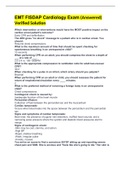-
1. Exam (elaborations) - Emt midterm exam study guide 2022 with complete solution
-
2. Exam (elaborations) - All nremt solution bank (2022)
-
3. Exam (elaborations) - Emt-b final exam - test bank 1 (answered 2022)
-
4. Exam (elaborations) - Emt-b final exam - test bank two (answered) 2022 update
-
5. Exam (elaborations) - (solution) emt-b midterm chapters 1-23 complete soluton, answered
-
6. Exam (elaborations) - Advanced emt definitions (complete with answers)
-
7. Exam (elaborations) - Advanced emt practice questions (complete solution) answered
-
8. Exam (elaborations) - Signs and symptoms emt, emt symptoms and signs, emt disease treatment, emt symptoms a...
-
9. Exam (elaborations) - Jones and bartlett emt test prep (answered 2022)
-
10. Exam (elaborations) - Emt intermediate final exam (answered 2022)
-
11. Exam (elaborations) - Advanced emt final multiple questions and answers (question bank)
-
12. Exam (elaborations) - Aemt final study set 1 (answered) question bank
-
13. Exam (elaborations) - Emt final/ perfect solution to ace your emt finals 2022/2023
-
14. Exam (elaborations) - Emt fisdap final exam questions and answers (2022/2023) (verified answers)
-
15. Exam (elaborations) - Fisdap emt readiness exam questions and answers (2022/2023) (verified answers)
-
16. Exam (elaborations) - Fisdap emt medical exam questions and answers (2022/2023) (verified answers)
-
17. Exam (elaborations) - Fisdap emt cardiology exam questions and answers 2022/2023
-
18. Exam (elaborations) - Fisdap emt airway exam complete solution 2022/2023
-
19. Exam (elaborations) - Fisdap readiness exam prep 2022 question bank
-
20. Exam (elaborations) - Fisdap paramedic final 2022 question bank 635 questions and answers, complete solutio...
-
21. Exam (elaborations) - Emt fisdap operations exam review, complete solution 2022/2023
-
22. Exam (elaborations) - Final emt readiness exam 2022/2023 verified solution
-
23. Exam (elaborations) - Emt fisdap final exam test prep (answered) verified solution
-
24. Exam (elaborations) - Fisdap emt cardiology and resuscitation exam review
-
25. Exam (elaborations) - Fisdap emt medical exam questions with correct answers
-
26. Exam (elaborations) - Fisdap exam 2 emt airway and ventilation exam study guide
-
27. Exam (elaborations) - Lc ready, emt review plus exam 1, complete solution
-
28. Exam (elaborations) - Emt fisdap final practice exam questions and answers (2022/2023) (verified answers)
-
29. Exam (elaborations) - Emt fisdap final exam (answered) complete solution 2022/2023
-
30. Exam (elaborations) - Emt fisdap readiness exam questions and answers (2022/2023) (verified answers)
-
31. Exam (elaborations) - Emt fisdap cardiology exam (answered) verified solution
-
32. Exam (elaborations) - (bundled) fisdap trauma, emt fisdap cardiology exam, fisdap / national registry, comp...
-
33. Exam (elaborations) - Emt fidsap airway exam (answered) complete solution
-
34. Exam (elaborations) - Emt readiness exam (tcc) (answered) verified solution
-
35. Exam (elaborations) - Emt final exam 2022 with all the correct answers(actual test graded a+)
-
36. Exam (elaborations) - Nys emt-b state written exam (answered) verified solution 100%
-
37. Exam (elaborations) - Emt-b final exam review latest updated 2022(a+ solution guide)
-
38. Exam (elaborations) - Emt-b final exam study set 2022/2023(answered) question bank
-
39. Exam (elaborations) - Emt practice final examination (answered) complete solution
-
40. Exam (elaborations) - Emt midterm exam study guide 2022 with complete solution
-
41. Exam (elaborations) - Emt final exam/ possibe questions and answers test bank (2022/2023;a+ guide)
-
42. Exam (elaborations) - Emt b final exam questions and answers (verified)
-
43. Exam (elaborations) - Fisdap cardiology emt initial exam, complete verified solution
-
44. Exam (elaborations) - Fisdap review exam 2 complete solution 2023
-
45. Exam (elaborations) - Emt fisdap readiness exam 4 questions and answers (2022/2023) (verified answers)
-
46. Exam (elaborations) - Emt fisdap readiness exam 2 questions and answers (2022/2023) (verified answers)
-
47. Exam (elaborations) - Emt practice test questions, (answered) 100% over 200 questions and answers
-
48. Exam (elaborations) - Jb learning: emt final exam complete verified solution 2023
-
49. Exam (elaborations) - Emt unit 2 exam jb learning, complete verified solution
-
50. Exam (elaborations) - Emt exam 4 jb learning with verified answers graded a+
-
Show more




